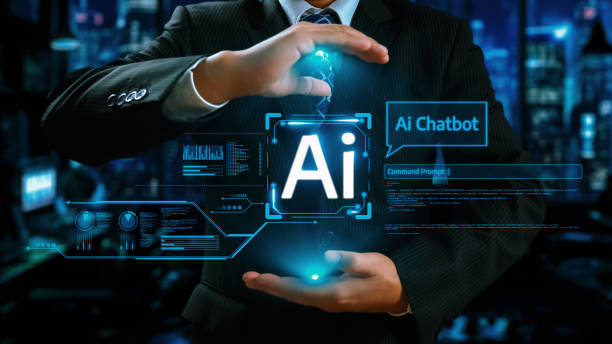What is Artificial Intelligence: Definitions, Applications, and Types

Artificial Intelligence (AI) means the imitation of #human intelligence processes by machines, especially computer systems.
These processes include learning (acquiring information and rules for using information), reasoning (using rules to reach approximate or definite conclusions), and self-correction.
Generally, AI refers to the effort to build machines capable of performing tasks that humans currently do better.
AI is no longer a science fiction concept and is widely used in many aspects of our lives today.
From voice assistants like Google Assistant and Siri to recommendation systems on Netflix and Amazon, AI is increasingly permeating our daily lives.
Types of Artificial Intelligence can be categorized based on their capabilities and performance.
Based on capabilities, AI can be divided into Narrow AI, General AI, and Super AI.
Narrow AI, as its name suggests, can only perform a specific task.
General AI is capable of performing any intellectual task a human can do.
Super AI surpasses human intelligence.
Based on functionality, AI can be divided into Reactive Machines, Limited Memory systems, Theory of Mind systems, and Self-Aware systems.
In today’s world, Artificial Intelligence has become a powerful driving force, transforming various industries and providing innovative solutions to complex challenges.
From healthcare and finance to transportation and entertainment, Artificial Intelligence is changing how we live and work.
Its ability to analyze vast amounts of data, automate tasks, and make intelligent decisions creates unprecedented opportunities for growth, efficiency, and progress.
Meanwhile, Artificial Intelligence is evolving and integrating into various systems, and it is expected to play a very important role in human life in the future.
Artificial Intelligence uses different algorithms to solve problems and improve human life.
Do you have an online store, but your sales are not as expected? Rasaweb solves your problem forever with professional e-commerce website design!
✅ Significant increase in conversion rates and sales
✅ Unparalleled user experience for your customers
⚡ Click to get a free consultation with Rasaweb!
Machine Learning: The Backbone of Artificial Intelligence

Machine Learning (ML) is a subset of Artificial Intelligence that enables computer systems to learn from data without explicit programming.
In other words, instead of being explicitly instructed on how to perform a specific task, machine learning algorithms allow computers to identify patterns by analyzing data and make decisions based on them.
Machine learning is a powerful tool for solving complex problems and has applications in various fields such as image recognition, natural language processing, prediction, and recommenders.
Types of Machine Learning include Supervised Learning, Unsupervised Learning, Reinforcement Learning, and Semi-Supervised Learning.
In supervised learning, the algorithm is trained using labeled data.
This means the data has specific inputs and outputs.
In unsupervised learning, the algorithm is trained using unlabeled data.
This means the data only has inputs and no specific outputs.
In reinforcement learning, the algorithm learns through trial and error.
This means the algorithm performs an action and is then rewarded or penalized based on the outcome of that action.
In semi-supervised learning, the algorithm is trained using a combination of labeled and unlabeled data.
Artificial Intelligence, alongside machine learning, is recognized as a fundamental tool for solving complex problems and improving system performance.
Artificial Intelligence, using machine learning algorithms, can identify patterns in data and make better decisions.
This powerful combination has widespread applications in various fields including medicine, finance, and manufacturing.
Currently, many businesses use Artificial Intelligence to analyze data and make optimal decisions.
Machine learning algorithms enable Artificial Intelligence to continuously learn from data and improve its performance.
Deep Learning: Inspired by the Human Brain

Deep Learning (DL) is a subset of machine learning that uses artificial neural networks with multiple layers to analyze data.
These networks are inspired by how the human brain works and are capable of learning complex patterns from vast amounts of data.
Deep neural networks have applications in various fields such as image recognition, natural language processing, speech recognition, and autonomous driving.
The architecture of deep neural networks includes various layers connected sequentially.
Each layer contains numerous neurons (processing units) that receive inputs, process them, and then send the output to the next layer.
Weights and biases in each neuron determine how inputs are processed.
Deep neural networks learn to identify complex patterns in data by adjusting weights and biases during the training process.
There are different types of deep neural networks, such as Convolutional Neural Networks (CNNs) used for image recognition and Recurrent Neural Networks (RNNs) used for natural language processing.
Artificial Intelligence and deep neural networks together are a powerful tool for solving complex and advanced problems.
Inspired by the structure of the human brain, deep neural networks are capable of learning complex patterns from large datasets and can be used in various fields such as image recognition, natural language processing, and autonomous driving.
Artificial Intelligence, using deep neural networks, can perform better in tasks that require deep understanding and analysis of data.
| Algorithm | Application | Advantages |
|---|---|---|
| CNN | Image Recognition | High Accuracy |
| RNN | Language Processing | Ability to learn sequences |
| GAN | Image Generation | Creative |
Natural Language Processing (NLP): Understanding and Generating Human Language by Machines

Natural Language Processing (NLP) is a branch of Artificial Intelligence that enables computers to understand, interpret, and generate human language.
NLP includes a wide range of tasks, including machine translation, text summarization, sentiment analysis, question answering, and text generation.
NLP has applications in various fields such as customer service, marketing, healthcare, and education.
NLP techniques include statistical methods, machine learning, and deep neural networks.
Statistical methods use probabilistic models to analyze language.
Machine learning algorithms use data to learn linguistic patterns.
Deep neural networks use complex architectures to understand and generate language.
The main tasks of NLP include Tokenization, Parsing, Named Entity Recognition (NER), Semantic Analysis, and Text Generation.
Artificial Intelligence and Natural Language Processing are integrated to enable machines to understand and generate human language.
This powerful combination has applications in various fields such as machine translation, text summarization, and sentiment analysis.
Artificial Intelligence, using NLP techniques, can communicate more naturally with humans and perform tasks that were previously only possible by humans.
In the future, it is expected that Artificial Intelligence, along with NLP, will play a very important role in improving communications and interactions between humans and machines.
Is your current e-commerce website not generating the sales you expect?
Rasaweb is an expert in professional e-commerce website design!
✅ An attractive and user-friendly website aimed at increasing sales
✅ High speed and security for an ideal shopping experience⚡ Get a free online store design consultation with Rasaweb!
Computer Vision (CV): Smart Eyes for Computers

Computer Vision (CV) is a branch of Artificial Intelligence that enables computers to see, interpret, and understand images and videos.
Computer Vision includes a wide range of tasks, including image recognition, image classification, object detection, object tracking, 3D reconstruction, and scene analysis.
Computer Vision has applications in various fields such as autonomous driving, robotics, security, medicine, and retail.
Computer Vision techniques include image processing methods, machine learning, and deep neural networks.
Image processing methods are used to improve image quality and extract features from images.
Machine learning algorithms use data to learn image patterns.
Deep neural networks use complex architectures to understand and interpret images.
The main tasks of Computer Vision include Edge Detection, Corner Detection, Image Segmentation, Face Detection, and Object Detection.
Artificial Intelligence and Computer Vision work together to enable computers to analyze and understand images and videos.
This combination has applications in various fields such as autonomous driving, robotics, and security.
Artificial Intelligence, using Computer Vision techniques, can understand its surroundings and make better decisions.
Currently, Artificial Intelligence is advancing and developing using Computer Vision and will play a very important role in various industries in the future.
Robotics: The Integration of Artificial Intelligence and the Physical World

Robotics is a branch of engineering that deals with the design, construction, operation, and application of robots.
Robots are machines that can perform tasks automatically.
Robots are usually equipped with sensors, actuators, and controllers that allow them to interact with their environment.
Robotics is a combination of mechanical engineering, electrical engineering, computer science, and Artificial Intelligence.
Applications of Robotics are very wide and include manufacturing industries, services, healthcare, space exploration, and military.
In manufacturing industries, robots are used for repetitive, dangerous, and precise tasks.
In services, robots are used to provide customer services, cleaning, and security.
In healthcare, robots are used for surgery, rehabilitation, and patient care.
In space exploration, robots are used to explore planets and collect samples.
In the military, robots are used for bomb disposal, reconnaissance, and surveillance.
Artificial Intelligence plays a very important role in robotics.
Artificial Intelligence enables robots to understand their environment, make intelligent decisions, and perform complex tasks.
Robots equipped with Artificial Intelligence can learn, adapt, and adjust to new conditions.
In the future, it is expected that Artificial Intelligence, along with robotics, will play a very important role in improving human lives and advancing various industries.
Applications of Artificial Intelligence in Various Industries

Artificial Intelligence is currently used in various industries and is transforming them.
Some of the most important applications of Artificial Intelligence in various industries include:
- Healthcare: Artificial Intelligence can be used for disease diagnosis, drug development, personalized care, and improving hospital efficiency.
- Finance: Artificial Intelligence can be used for fraud detection, risk management, financial advisory, and improving customer services.
- Retail: Artificial Intelligence can be used for recommendation systems, inventory management, demand forecasting, and improving customer shopping experience.
- Manufacturing: Artificial Intelligence can be used for process automation, improving product quality, reducing costs, and predicting machine failures.
- Transportation: Artificial Intelligence can be used for autonomous driving, route optimization, traffic management, and improving safety.
These are just a few examples of the applications of Artificial Intelligence in various industries.
With the advancement of Artificial Intelligence, its applications are expected to expand across different industries and have deeper impacts on our lives.
| Industry | AI Application | Benefits |
|---|---|---|
| Healthcare | Disease Diagnosis | Accuracy, Speed |
| Finance | Fraud Detection | Loss Reduction |
| Retail | Product Recommendation | Increased Sales |
| Manufacturing | Automation | Efficiency |
Challenges and Limitations of Artificial Intelligence

Despite the high potential of Artificial Intelligence, there are also challenges and limitations in this field.
Some of the most important challenges and limitations of Artificial Intelligence include:
- Need for large data: Artificial Intelligence algorithms require a lot of data for training.
Collecting, preparing, and labeling this data can be time-consuming and costly. - Lack of transparency: Some Artificial Intelligence algorithms, such as deep neural networks, are very complex, and understanding how they work is difficult.
This lack of transparency can raise concerns about the accountability and reliability of these systems. - Bias: Artificial Intelligence algorithms can learn and reproduce existing biases in training data.
These biases can lead to unfair and discriminatory decisions. - Ethical issues: Artificial Intelligence raises important ethical questions, such as accountability for decisions made by Artificial Intelligence systems, privacy preservation, and the impact of Artificial Intelligence on employment.
Addressing these challenges and limitations is essential to ensure the responsible development and use of Artificial Intelligence.
Are you tired of your company’s website not meeting your expectations? With Rasaweb, design a professional website that showcases the true face of your business.
✅ Increase attraction of new customers and sales leads
✅ Enhance your brand’s credibility and trust among your audience
⚡ Get a free website design consultation!
The Future of Artificial Intelligence: Predictions and Prospects

The future of Artificial Intelligence is very bright and full of potential.
Artificial Intelligence is expected to play a more important role in our lives and transform various industries in the future.
Some of the most important predictions and prospects for the future of Artificial Intelligence include:
- Expansion of Artificial Intelligence applications: Artificial Intelligence applications are expected to expand across various industries, and Artificial Intelligence will become an indispensable part of our daily lives.
- Development of General Artificial Intelligence: The long-term goal of many Artificial Intelligence researchers is the development of Artificial General Intelligence (AGI).
AGI is a system that can perform any intellectual task a human can do. - Increased processing power: Advances in hardware and software will increase the processing power of computers and enable the development of more complex and powerful Artificial Intelligence algorithms.
- Increased focus on ethics: With the expansion of Artificial Intelligence applications, more attention is expected to be paid to ethical issues related to Artificial Intelligence, and efforts will be made for its responsible development and use.
Given these predictions, Artificial Intelligence will play a very important role in shaping our world in the future.
How to Learn Artificial Intelligence: Resources and Guidance

If you are interested in learning Artificial Intelligence, many resources and guidelines are available to you.
Some of the best ways to learn Artificial Intelligence include:
- Online courses: Online learning platforms such as Coursera, edX, and Udacity offer various courses in Artificial Intelligence.
- Books: There are many books on Artificial Intelligence that you can use to learn basic and advanced concepts of Artificial Intelligence.
- Practical projects: The best way to learn Artificial Intelligence is by doing practical projects.
By doing projects, you can apply theoretical concepts in practice and develop your skills. - Online forums and groups: Participating in Artificial Intelligence online forums and groups can help you connect with other Artificial Intelligence enthusiasts, ask your questions, and learn from others’ experiences.
By using these resources and guidelines, you can effectively learn Artificial Intelligence and progress in this field.
Frequently Asked Questions
| Question | Answer |
|---|---|
| 1. What is Artificial Intelligence (AI)? | It is a branch of computer science that aims to create machines capable of simulating human intelligence and performing tasks that require human thinking, such as learning, problem-solving, and decision-making. |
| 2. What are the main types of Artificial Intelligence? | They can be classified into Narrow AI, which focuses on a specific task; General AI, which possesses comprehensive human capabilities; and Super AI, which surpasses human intelligence. |
| 3. Mention some common applications of Artificial Intelligence in our daily lives. | These include voice assistants (such as Siri and Alexa), recommendation systems (such as Netflix and Amazon), self-driving cars, facial recognition systems, and spam filters. |
| 4. What is the difference between Artificial Intelligence and Machine Learning? | Artificial Intelligence is the broader concept of creating intelligent machines, while Machine Learning is a subset of Artificial Intelligence that focuses on enabling systems to learn from data without explicit programming. |
| 5. What is Deep Learning? | It is a subset of Machine Learning that uses multi-layered artificial neural networks (deep neural networks) to process data and discover complex patterns, and is used in image and speech recognition. |
| 6. What are the most prominent benefits of Artificial Intelligence? | Improving efficiency and productivity, automating repetitive tasks, making better decisions based on big data analysis, and developing solutions for complex problems in fields such as medicine and science. |
| 7. What are the main challenges facing the development and deployment of Artificial Intelligence? | These include the need for vast amounts of high-quality data, privacy and security issues, bias in data and algorithms, and high development and maintenance costs. |
| 8. Does Artificial Intelligence raise ethical or social concerns? | Yes, it raises concerns related to privacy, algorithmic bias, job displacement due to automation, responsibility for errors made by intelligent systems, and the need for a regulatory framework. |
| 9. How can Artificial Intelligence affect the future of the job market? | It can lead to the automation of some routine jobs, but it will also create new jobs requiring advanced skills in the development, operation, and maintenance of AI systems. |
| 10. What are some modern or promising technologies in the field of Artificial Intelligence? | These include advanced Natural Language Processing (NLP) (such as large language models like ChatGPT), computer vision, robotics, and Generative AI. |
And other advertising agency services by Rasaweb in the field of advertising
Smart Link Building: Designed for businesses seeking online growth through precise audience targeting.
Smart Link Building: An innovative platform for improving customer behavior analysis using real data.
Smart Custom Software: A fast and efficient solution for improving SEO ranking with a focus on SEO-driven content strategy.
Smart SEO: A dedicated service for campaign management growth based on real data utilization.
Smart Google Ads: A professional solution for user engagement with a focus on optimizing key pages.
And over hundreds of other services in internet advertising, advertising consultation, and organizational solutions
Internet Advertising | Advertising Strategy | Advertorials
Sources
What is Artificial Intelligence and How Does It Work?Artificial Intelligence: What is it?What is Artificial Intelligence and How Does It Work?Artificial Intelligence
Are you ready to transform your business in the digital world? Rasaweb Ad Agency, by offering comprehensive services including personal website design, SEO, and content marketing, provides innovative solutions for your growth and visibility.
📍 Tehran, Mirdamad Street, next to Central Bank, Southern Kazeroun Alley, Ramin Alley, No. 6



